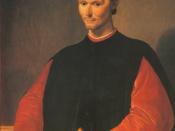The Ideas and Advices of Machiavelli
Niccolo Machiavelli, a contemporary of Copernicus, is generally accepted as an early contributor to the scientific revolution, because he looked at power and the nature of sovereignty through the eyes of a scientist, focused completely on the goal without regard for religion and morals and ethics. In The Prince, Machiavelli offers advice to rulers as to what they must do to achieve their aims and secure their power. His three ideas that he felt a prince should do is to have the ability to act boldly, to protect his power and to appear unwavering while being flexible. Machiavelli taught that the way princes actually do govern often differs substantially from the way they ought to govern, according to medieval Christian virtues. His ideas are in stark contrast with traditional church teachings. Machiavelli discussed a multitude of topics in offering his advice for rulers. A few of his advices are Generosity and Parsimony, Integrity and Reputation.
Today's college student might consider Machiavelli's ideas and advices as they plan for their endeavors into the corporate business world.
Machiavelli, in discussing Considering Generosity and Parsimony ,offers the idea that generosity can lead to self destruction. "I argue it would be good to be thought generous; nevertheless, if you act in the way that will get you a reputation for generosity, you will do yourself damage." He also ponders the thought that generosity can bring about hatred. "Squandering other people's money does not do your reputation any harm, quite the reverse. The problem is with squandering your own. There is nothing so self-defeating as generosity, for the more generous you are, the less you are able to be generous. Generosity leads to poverty and disgrace, or, if you try to escape that, to rapacity and hostility. Among all...


